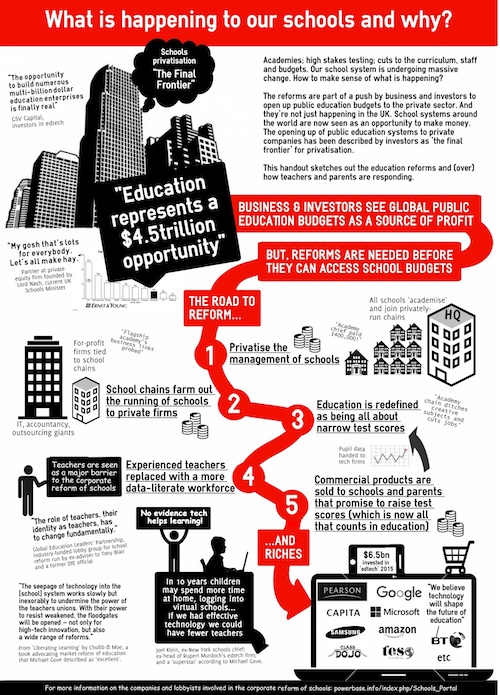Schools Portal
A guide to the companies, lobbyists and think tanks involved in the privatisation of schools |
|---|
|
|
What is happening to our schools? The opening up of education systems to private companies has been described as ‘the largest market opportunity’ since healthcare was privatised. 'Let's all go forth. Let's all make hay,' as one private equity investor said at a 2015 UK education investment conference. A vast education industry now exists to profit from schools. It includes: education publishers, global technology firms, privately-managed school chains, and financial sector investors. Our profiles of these and other players on the Schools Portal aim to show which companies are leading the reforms; their networks of lobbyists working across continents; the politicians aiding them; the messages being used to sell these changes and more. |
|
|
A bit of background
The 'global education reform movement', or GERM as it has become known by critics, is pushing radical changes on school systems around the world.
‘Education reform used to be something that each country did individually,’ says leading reformer and Pearson adviser, Michael Barber. Today it is a ‘global phenomenon’, he says.
To imagine the changes envisaged by the corporate education industry requires that you put aside the notion that a publicly funded education will remain something delivered in a school by teachers and provided by the state.
The role of states in providing education is changing, with governments opening up schools to the market and corporate providers. Schools are being forced to compete in this market.
Testing has become more prevalent and important in classrooms, with heads and teachers being judged, and financially penalised in some cases, on an increasingly narrow set of standards. The focus on 'standardised testing' suits large corporate providers of education services operating across borders, but not children.
Technology is increasingly being used to teach, test and track students’ progress. While technology can be a useful tool among many, some education reformers see it as a way of making schools more efficient, and cheaper. Computer-based approaches to learning require far fewer teachers per student, some suggest half as many teachers or even fewer. To some advocates on the right, technology is a way of usurping teacher control of education.
‘The world is in the early stages of a historic transformation in how students learn, teachers teach, and schools and school systems are organised’, according to two advocates of this ‘revolution’, John Chubb and Terry Moe of the US conservative Hoover Institution. Their 2009 book, Liberating Learning, details how technology will deliver this transformation through: its ‘seeping-in’ to existing schools; virtual schooling; new education providers; data systems designed to monitor teacher performance; and its ‘slow but inexorable undermining of the political power of the teachers unions’. The UK's arch-reformer, former education secretary, Michael Gove describes Liberating Learning as an ‘excellent book’.
Such radical reforms have been subject to little public debate and have no democratic mandate. They are also largely unsupported by evidence that they raise standards in schools. Why then have such reforms taken hold? What part are lobbying and influence campaigns playing in persuading governments to adopt this particular reform agenda? And how are the changes being sold to citizens, teachers and parents?
The research contained in Powerbase's Schools Portal attempts to answer some of these questions.
| ||||||||
References |

